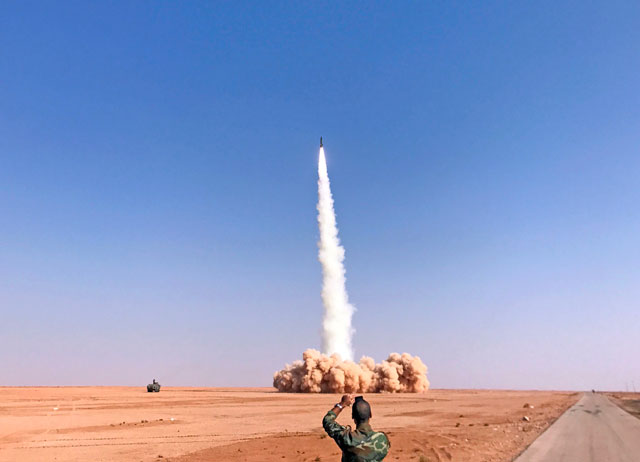BEIRUT — The Daesh extremist group recaptured Albu Kamal in eastern Syria on Saturday after a fierce fightback to save the last urban bastion of its collapsing "caliphate".
The rebound came as the United States and Russia issued a surprise joint presidential statement saying there was "no military solution" to Syria's grinding six-year war.
The two countries have long backed opposite sides in Syria, but the Kremlin on Saturday said US President Donald Trump and Russian counterpart Vladimir Putin made progress during a brief meeting on the sidelines of a summit in Vietnam.
Trump and Putin also "confirmed their determination to defeat ISIS", an alternative name for Daesh.
The extremist group overran swathes of territory in Syria and Iraq in 2014, but its self-styled "caliphate" has since been whittled down to a pocket of land along the border between the two countries.
Daesh is putting up a fierce defence there, particularly for the vital Syrian border town of Albu Kamal, said the Syrian Observatory for Human Rights monitoring group.
Syrian regime forces and allied militia from Lebanon, Iraq and Iran overran Albu Kamal on Thursday but lost the town again just two days later after a string of Daesh counterattacks and ambushes.
“IS [Daesh] fully recaptured Albu Kamal, and regime forces and allied militia are now between one to two kilometres from the city limits,” Rami Abdel Rahman, head of the Britain-based observatory, said on Saturday.
Daesh squeezed
in Iraq
Across the border, Iraqi forces seized on Saturday several villages from the militants in an offensive to capture the last Daesh-held section of their country.
The operation’s commander, General Abdelamir Yarallah, said his forces captured Rumana and 10 other villages as they worked their way towards the Euphrates Valley town of Rawa, the last Iraqi town still held by Daesh.
The extremist group has in the space of a few weeks seen its “caliphate” shrink to a small rump and lost major cities such as Mosul in Iraq, and Raqa and Deir Ezzor in Syria.
Albu Kamal is the last significant Syrian town it controls. Losing it would cap the group’s reversion to an underground guerrilla organisation with no urban base.
Daesh rose to prominence in the chaos of Syria’s conflict, which broke out in 2011 with protests against President Bashar Assad.
It has since evolved into a complex war that has killed more than 330,000 people, forced millions more to flee, and left much of the country in ruins.
Violence has broadly decreased since a series of “de-escalation zones” have been put in place in recent months in battlefronts across the country.
‘Just like Iraq’
Multiple rounds of peace talks hosted by the United Nations in Geneva have failed to resolve Syria’s entrenched conflict.
Saturday’s joint statement from the US and Russian presidents urged Syria’s warring sides to take part in a new round of talks later this month in Switzerland.
“What the joint statement indicates is a commitment to get this to a political reconciliation and peace process. That serves their interest, it serves our interest,” a senior US State Department official said on Saturday.
The official said it was likely that Syria’s post-conflict political system would be “a power-sharing arrangement just like we ended up with in Iraq”.
“Syria has those same complex dynamics so there’s going to be Alawite presence, there’s going to be Sunni representation, it’ll be a similar dynamic,” the official said.
The official expected that future parliamentary and presidential elections would see the Syrian people “decide they want different leadership”.
Assad, a member of Syria’s minority Alawite community, the official said, would be allowed to go “wherever he would like to go. Unless he’s under war crimes investigations”.
